- Home
- Tobias Wolff
In Pharaoh's Army Page 10
In Pharaoh's Army Read online
Page 10
“What about you?”
“I’m used to it.”
They were aviator glasses, the real thing, much better than the shades I’d left in the apartment. He had me put them on, take them off so he could make adjustments, put them on again. “Perfect,” he said. “M-made for you. Keep ’em.”
I can’t.
“They’re yours. End of discussion.”
I had the sense to stop arguing and after that he seemed happier to be with me. We walked and talked until he got winded and sat on a bench with his hands on his knees, looking for all the world like the old Jewish guys I used to see on the benches in Sarasota when I was a kid. Fleshy, bald, sorrow-eyed, hair bristling from their ears. That shouldn’t have come as any surprise—he was an old Jewish guy, whether he admitted it or not—but I hadn’t been prepared to see him in just this light. Not my father, whose physical presence could crowd a room, whose deep voice and imperial bearing had served as collateral for the most fabulous promises and claims. I never saw him do a moment’s exercise, but the one time he ever really hit me—I’d asked for it—my head snapped back so hard that it shocked him even more than me, and he burst into tears. Even when I loved him, even when I despised him, there had always been a certain fear. No more. His weakening put me at ease. I waited as he collected himself, and let him set the pace on the walk home.
We had a couple of drinks when we got back. The apartment was small but he’d managed to furnish it comfortably and even with some style. I couldn’t help but notice the color television, as I had earlier noticed the watch he was wearing—a Heuer chronograph that must have been worth several hundred dollars. There were other objects of value, more than could be strictly accounted for by welfare and Geoffrey’s checks, but I kept my questions to myself. We washed a heap of dishes and listened to Art Tatum and got pretty loose, whereupon I suggested we go out for dinner, on me. He knew just the place. We duded ourselves up and drove there in his ’53 Cadillac, which, he hurried to tell me, he’d picked up for a song.
THE RESTAURANT BAR was cool and dark. We made a stop there, then proceeded to our table with fresh glasses in hand. By the time our meat arrived, thick bloody steaks served on slabs of wood, we were pretty well oiled, but that idn’t stop me, with my father’s judicious concurrence—“I suppose I could manage a glass”—from ordering a bottle of red.
He did indeed manage a glass. So did I. We were flush, not so much with the wine itself as with the long tangled journey we’d made to share it. My father began to preen a little. He bantered with the waiter, sent tribute to the kitchen. He exchanged greetings with our neighbors (“My boy here’s in for the day, making sure the old man’s keeping his nose clean …”). His voice grew deeper as the night went on, his phrasing and inflections more urbane. He sat up straighter, squared his great shoulders, laughed from deep in his chest as he recalled the old stories, the old names. Nothing was said about the final destination of my trip. I noticed the perfect drape of his linen jacket, the way his gold signet ring flashed in the candlelight. I could see how pleasure lightened him and restored his patrician authority. This was when I chose to ask if it was true that his family was Jewish.
He went still, the light died out of his eyes. “No,” he said. “Of course not. Why?”
“I’m just curious. They were my family too, and I don’t know anything about them.”
“Episcopalians.”
“Really? Both sides?”
“Both sides.”
“What about your mother? Her maiden name was Krotoshiner, right? Isn’t that a Jewish name?”
“German.”
“And Wolff?”
“German. East Prussian, if you want to be particular.” He looked around as if to call for the bill.
“But—correct me if I’m wrong—wasn’t your mother in Hadassah?”
“Hell’s bells, son, I don’t know. She belonged to every g-goddamned charity in Hartford, maybe she was in that one too. Sure! Why not.”
I kept after him in this falsely innocent way, as if I were just trying to clear up some minor confusions of my own, until he lost patience.
“For Christ’s sake,” he said, “what do you want?”
I couldn’t answer him. I didn’t know what I wanted. He got up and went outside while I paid the check. I thought he might very well leave me there, but he was waiting in the car, staring dead ahead. We spoke only once on the drive home, when he ran a stop sign. I pointed this out to him. Without looking at me he said, “I stopped at the last one.”
The couch was a pull-out. We made up the bed in silence, then he asked if I needed anything.
“Could we have a nightcap?”
He was stiff about it but he poured a couple of drinks and put on a record.
“Hey, that’s great,” I said. “Who is it?”
He told me, and then told me who the sidemen were, and when it was recorded, and why it was such a hard record to find nowadays. This led him to play me several more of his treasures. He listened exactly the way Geoffrey listened, making rhythm noises, leaning forward suddenly with narrowed eyes when one of the players commenced a star solo, compelling me to listen with him. When he saw that I was fighting sleep he collected our glasses and turned off the stereo. I stood up, weaving with drink and fatigue. “Good night,” I said.
“You sure you have to leave tomorrow?”
“Afraid so.”
“Well, kiddo …”He put his arms around me and I let myself lean against him. It was a relief not to have to look into his face anymore, into his terrible sadness. We didn’t say a word. I don’t know how long we stood like that, but it began to seem a long time. Then I straightened up, and he let go of me.
AT THE REPLACEMENT DEPOT in Oakland I met up with an acquaintance from Fort Bragg, a young lieutenant with the 82nd Airborne. His name was Stu Hoffman. He was freckle-faced and skinny and excessively thoughtful. No command presence. An even more unlikely officer than I was. We weren’t friends, but we used to run into each other at the officers club and talk about writing. He also had ambitions in that direction. I didn’t take them very seriously because he was nuts about Thomas Wolfe, and I looked down on both Wolfe and his admirers, though I had recently admired him myself. Stu for his part didn’t understand my reverence for Hemingway. Hemingway, he said, did not love words, and to be a writer you had to love words.
We were scheduled for the same flight to Vietnam. They’d given us two entire days in Oakland for out-processing but there really wasn’t that much to do, and we were free by the afternoon of the first day. We changed into civvies and caught a cab into San Francisco, to the Haight-Ashbury, to see if we could find some hippies having LSD trips. Maybe there would be a Happening or a Be-In. That was the way we proposed the excursion, gee-whizzing it up, cartooning the expectations of a pair of rubes who got their picture of the world from the Des Moines Register.
In fact we did find a Happening in progress, right on Haight Street, and there were hippies, and some of them gave signs of being in touch with pretty far-off places. Stu and I were issued batik headbands and embraced by each of a party of soulful wanderers who identified themselves as “the Hug Patrol.” We did not laugh at them, nor at the earnest demonstrations of candlemaking and tie-dyeing, nor at the bearded, bare-chested man in harem pants who sat on a blanket with his eyes closed, playing a sitar. Their goodwill was too naked and guileless for that. They were like children playing, but more touching because they weren’t children. I was embarrassed by all this determined innocence yet somehow protective of it. Made wistful. Chastened.
We tied the headbands around our cropped skulls and moseyed along the street, returning smile for smile, walking tenderly in our spit-shined low quarters as if afraid of breaking something.
Afterward we went to a bar near the Panhandle where we drank pitchers and told our stories. I talked, but Stu talked more. He’d been raised in Chicago by his father’s parents, because his mother had died when he was young and his father was out of the count
ry for weeks and even months at a time. He was a petroleum engineer. A living legend, Stu said. Mention the name Bill Hoffman to anybody in the oil game and they’d buy you a drink on the spot. The man was amazing. He’d found oil in places there wasn’t supposed to be any, time and time again. And before that, before he went to college and all, he’d been a champion motorcycle racer. And a war hero, one of the original paratroopers. Jumped with General Gavin over Normandy and all the rest of it. Two Purple Hearts, a Silver Star, and a whole shitload of other medals, including some from France. De Gaulle personally pinned one on him and kissed his cheeks. Stu had a picture of it in his room at home—Charles de Gaulle putting a lip-lock on his father.
His father was one in a million, just a little hard to talk to. He wouldn’t tell you what he was thinking. You were supposed to know. When Stu decided to drop out of the Colorado School of Mines his father didn’t say a word against it, though it was his own alma mater. Stu would’ve stuck it out to keep him happy, but he was flunking most of his courses; the only thing he ever wanted to do was read and that didn’t get you very far at CSM. Anyway his father didn’t say much when he quit, just, “It’s your life, live it any damn way you want.” When Stu enlisted in the army the most he’d say about it was, “Don’t let the bastards con you into anything,” and to this day he hadn’t managed to congratulate him on making it through Officer Candidate School and airborne training. Stu figured he must be happy to see him keeping up the family tradition, but it just wasn’t his way to show it.
Terrific guy, though. Solid as a rock.
Stu said his father was flying in the next day to see him off. He asked if I’d join them for dinner, and took it as a big favor when I said yes.
“He’s great,” Stu said. “Really. Just a little hard to talk to sometimes.”
Later that night we tried to get into the Top of the Mark and were turned away for not wearing ties. We stood outside the Mark Hopkins and howled, “O lost, and by the wind grieved, ghost, come back again!” The doormen were our only audience, and they ignored us. They stood at parade rest in their frogged overcoats and acted as if we weren’t there. They made us look like imbeciles. We moved off down the street, staggering to show how drunk we were.
I TOOK a bus into town the next day and walked around North Beach, searching for Kerouac’s old hangouts. Later I went back to the Haight. The Happening was over but I kept seeing the same credulous faces, or maybe they were different faces with the same look. Again I felt that wistfulness of the day before. Without talking to anyone except a girl who tried to sell me a belt, unconscious of my purpose in returning, I wandered the neighborhood until it was time for dinner.
We met up in a seafood restaurant down by Fishermen’s Wharf. Stu had worn his uniform and looked completely implausible in the big jump boots and starched khakis covered with insignia, awkward and self-conscious, like a Boy Scout with all his merit badges on.
The first thing Mr. Hoffman said to me was, “So you’re the other one about to get his ass shot off.”
Stu laughed miserably.
“I hope not,” I said.
“Well, that’ll do you no end of good,” Mr. Hoffman said. He didn’t smile. He had freckles like Stu’s and thin white lips—also freckled—and curly red hair. His skin looked taut over his high cheekbones. He ordered drinks and watched me impatiently while I answered Stu’s questions about my day. I didn’t mention going back to the Haight.
Mr. Hoffman wanted to know what I thought of General William Childs Westmoreland.
Stu slumped in his chair. He looked tired.
“I’ve never met him,” I said.
“You must have an opinion.” Mr. Hoffman broke off a piece of bread with a sharp twisting motion, the way you’d tighten a coupling. The backs of his freckled hands were covered with wiry hair. “Starting tomorrow he holds the papers on you, right? So what do you think?”
I didn’t know how to answer—what he hoped to hear.
“You think he cares about you?”
I considered this. “Yes, given the exigencies of command.”
“Exigencies!” He looked at Stu. “No wonder you two hit it off.”
“We’ve been all through this, Dad.”
“I’m asking your friend a simple question. You mind?” he said to me.
I looked over at Stu. He picked up the menu and started to read it.
“Stu wants to be a teacher,” Mr. Hoffman said. “Maybe even write some books. What do you think of that?”
“I think it’s great.”
“So do I. Nobody in our family has ever written a book, far as I know. He can do it too, Stu can. Stu is not your general-issue human being. But I guess you know that.”
The waiter came over to take our orders. After he left, Mr. Hoffman said, “Did you know that General William Childs Westmoreland ordered a parachute jump in high winds that got a whole bunch of boys killed? Broke their necks and every other damned thing. This was Fort Campbell, understand—not Vietnam. No military necessity.”
“I’ve heard mention of it.”
“And what does that tell you about General William Childs Westmoreland?”
“I don’t know. It was a training jump. I guess you could say training is a military necessity.”
“Would you swallow that horseshit if one of those boys was your son?”
I took a drink and set my glass down carefully.
Mr. Hoffman said, “Every single one of those boys was somebody’s son.”
“Dad.”
“He didn’t lose a wink. Came out clean as a whistle. What do you owe those bastards anyway?” he said to Stu. “You think you owe them something?”
Stu closed his eyes.
“I’ll tell you what he cares about, him and that sorry dickhead from Texas. How he looks. That’s it. That is the be-all and end-all of his miserable existence.”
Mr. Hoffman worked this vein until our dinners came. He shoved his food around for a while and then stood and said, “Excuse us.” He waited while Stu got up, and the two of them left the dining room. They were gone long enough for me to finish my dinner. Neither of them said anything when they came back. Stu didn’t look at me. He sat down and began eating, stiffly, the way they made us eat in OCS, shoulders squared, eyes glazed, chewing like a machine.
Mr. Hoffman took a few bites and pushed the plate away. “What does your father think?” he asked me.
“About what?”
“About you getting your ass shot off for the greater glory of Lyndon Baines Johnson and William Childs Westmoreland.”
“I’m not sure. We haven’t been in very close touch.”
“Stu and I, we haven’t been in close touch either. But that’s damn well going to change. Right, Stu?” Mr. Hoffman touched his arm. Stu nodded. Mr. Hoffman took his hand away and Stu went on eating.
“You ought to talk to your father,” Mr. Hoffman said. “He might have a thing or two to say about this.”
“It doesn’t look like we’re going to have a chance.”
“Well, that’s a shame.”
Mr. Hoffman insisted on going upstairs to the piano bar for a drink. Three customers were sitting together at the piano, a TWA pilot and two women. When the pianist finished the song he was playing, the TWA pilot asked for “Theme from The Apartment.” The woman to his right bumped him with her shoulder and said, “Ronnnn!” She rolled her eyes at us, miming exasperation with him for hinting at their secrets. She had a round face full of physical good nature. The pilot murmured something and she bumped him again. “You big goof,” she said.
The other one looked at me just long enough to reveal how bored she was with the sight before her, then turned away. She was drooped over a cigarette, a bony blonde with a long pale neck and pouty lips.
The pianist doodled prettily around the keyboard, then entered the song. He played it with his eyes half closed. At the end he ducked his head at the applause and took a drink from a glass of milk.
The woman
with the pilot leaned forward and, staring at Stu’s jump wings, asked if he was in the air force. Her brother was in the air force, she said, in Guam.
“Army,” Stu said. Then, with helpless pride, “Paratroops.” He bent his head toward me. “Both of us.”
“Been over yet?” the pilot asked.
“Tomorrow morning.”
“Give ’em hell,” the pilot said.
“Christ almighty,” Mr. Hoffman said. “I need a cigar.” He slid off his stool and left the room.
The pianist started playing “It Was a Very Good Year.”
I looked at Stu. “I thought he wouldn’t tell you what was on his mind.”
He was picking at his cocktail napkin. “It’s been like this all day. Bam bam bam. Bam bam bam. He just won’t let up.”
“What’s he so worked up about?”
“He doesn’t want me to go,” Stu said.
“So I gather. It’s not like you have a choice.”
“He doesn’t see it that way.”
“Come on. What’re you supposed to do—desert?”
Stu didn’t answer.
“What, he wants you to desert?”
Stu looked at me. He still didn’t say anything.
“It’s a federal offense,” I said.
He grinned.
“Well, it is.”
“A federal offense,” Stu said. “That’s great. I haven’t heard that since I was a kid.”
Mr. Hoffman was followed back into the bar by two women in rustling evening dresses and two men wearing fancy-stitched Western suits with bolo ties, pointy boots, and bronc-buster belt buckles. Their entry had the quality of a stampede. They came in and milled around, the women rubbing their arms in the chill of the air-conditioning, the men bellowing at each other and rocking back on their heels to fire bursts of laughter toward the ceiling. They found their way to the piano and set up a trading post—purses, piles of coins, wallets, cigarettes, lighters in silver-and-turquoise cases. The women wore a lot of brilliant jewelry. All four of them ordered margaritas and smiled around at the rest of us to show we had nothing to fear.

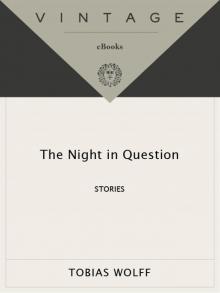 The Night in Question: Stories
The Night in Question: Stories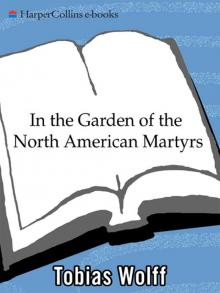 In the Garden of the North American Martyrs
In the Garden of the North American Martyrs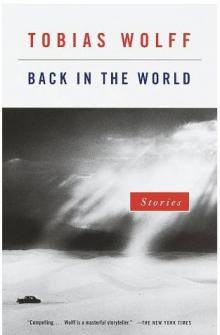 Back in the World: Stories
Back in the World: Stories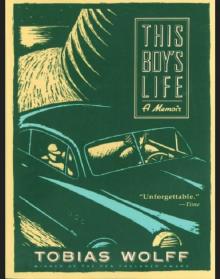 This Boy's Life
This Boy's Life Old School
Old School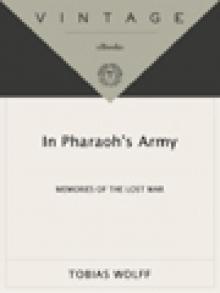 In Pharaoh's Army: Memories of the Lost War
In Pharaoh's Army: Memories of the Lost War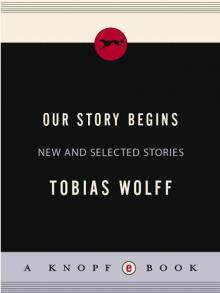 Our Story Begins: New and Selected Stories
Our Story Begins: New and Selected Stories The Barracks Thief
The Barracks Thief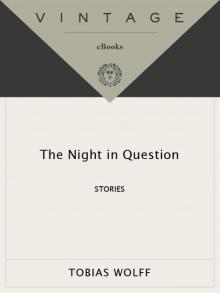 The Night In Question
The Night In Question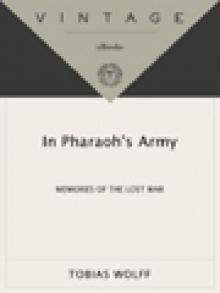 In Pharaoh's Army
In Pharaoh's Army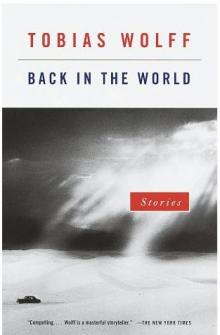 Back in the World
Back in the World